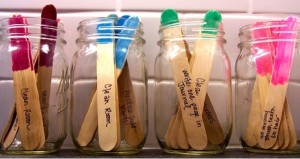Organizing Kids
Getting organized at home always includes children and chores.
This can be the easiest way to get some home help and reduce your daily household workload.
 But more often than not getting children to do chores well can often seem more time consuming than helpful.
But more often than not getting children to do chores well can often seem more time consuming than helpful.
Sometimes making the decision to do the chores yourself can appear to be the easiest road to follow.
Including your children in daily household management can help them develop self responsibility, give your child a sense of value in your home, create a team atmosphere and can develop good habits and organizing skills at an early age.
Here are five strategies you can use to make children participating in chores a success in your home.
Work on doing one chore at a time well. Don’t overload your child with a million things to do every day. Give them one chore a day and in the beginning help them until it is done well. When this chore becomes more of a habit, give them a second chore to do, and let them have the space and time to learn how to do this chore well until they don’t need any reminders. This is the beginning of developing good independent habits and routines.
Make chores an opportunity to be social. Children love to help and chat with their parents. In the beginning doing chores together can create a fun atmosphere that makes time fly as well as giving you the opportunity to model how to perform the task well. Little things like cleaning the kitchen while your child unloads the dishwasher and having a nice conversation can go a long way.
Acknowledge their contribution. Let Dad or Mom or anyone important know what they did and acknowledge how valuable their help is and how much you appreciate what they do. Any praise is valuable and will make your child glow with pride. This supports those feelings of being included, of being important and being of value and creates a team feeling within your family.
Set your boundaries and get play and chores in balance. Removing children from the computer, T.V. or play to help out will always be difficult so timing is everything. When you plan a chore, make sure you are clear and communicate when it needs to be done. Examples are making beds before school; watering plants before play, no T.V. until rooms are picked up. Plan chores in the morning, just after school, before Saturday play or before they leave the house are times that can all work well.
Be consistent. Follow through and consistency are really important and getting yourself organized enough to choose what chores you need done, how you will model the task, what follow through may be needed and how you can support your child is critical and can save you a lot of frustration. Get clear on what chores are daily, weekly or monthly and follow through to make sure they are done.
Try these strategies for getting organized at home so you can discover how to organize help and foster the seeds of good organizing habits, team spirit and independence in your children and your family

